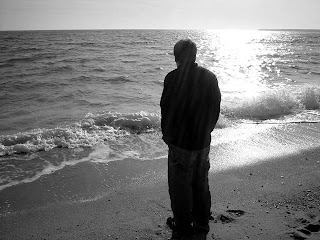Dennis sent me this link to an interesting paper on non-believing clergy. It is great insight into several ministers who share their stories about how they came to doubt their belief in the God they were brought up with and in the stories that they had been taught as literal.
I knew a few ministers in Armstrongism that also held these similar beliefs, yet they continued on. There are a couple in UCG and a couple in LCG that I knew that felt this way. You can imagine the wrath of god that Meredith would reign down on them if he knew.
Some of the guys from UCG are so entrenched and wrapped up in the church that they see no logical way out. They know they will loose everything, houses, homes, families and most importantly friends. It's that intimate contact with friends and co-workers in the faith that keeps them in place.
It is truly a struggle that is obviously quit painful.
The loneliness of non-believing pastors is extreme. They have no trusted confidantes to reassure them, to reflect their own musings back to them, to provide reality checks. As their profiles reveal, even their spouses are often unaware of their turmoil. Why don’t they resign their posts and find a new life? They are caught in a trap, cunningly designed to harness both their best intentions and their basest fears to the task of immobilizing them in their predicament. Their salaries are modest and the economic incentive is to stay in place, to hang on by their fingernails and wait for retirement when they get their pension.
Confiding their difficulties to a superior is not an appealing option: although it would be unlikely to lead swiftly and directly to an involuntary unfrocking. No denomination has a surplus of qualified clergy, and the last thing an administrator wants to hear is that one of the front line preachers is teetering on the edge of default. More likely, such an acknowledgment of doubt would put them on the list of problematic clergy and secure for them the not very helpful advice to soldier on and work through their crises of faith. Speaking in confidence with fellow clergy is also a course fraught with danger, in spite of the fact that some of them are firmly convinced that many, and perhaps most, of their fellow clergy share their lack of belief.
What gives them this impression that they are far from alone, and how did this strange and sorrowful state of affairs arise? The answer seems to lie in the seminary experience shared by all our pastors, liberals and literals alike. Even some conservative seminaries staff their courses on the Bible with professors who are trained in textual criticism, the historical methods of biblical scholarship, and what is taught in those courses is not what the young seminarians learned in Sunday school, even in the more liberal churches. In seminary they were introduced to many of the details that have been gleaned by centuries of painstaking research about how various ancient texts came to be written, copied, translated, and, after considerable jockeying and logrolling, eventually assembled into the Bible we read today. It is hard if not impossible to square these new facts with the idea that the Bible is in all its particulars a true account of actual events, let alone the inerrant word of God. It is interesting that all our pastors report the same pattern of response among their fellow students: some were fascinated, but others angrily rejected what their professors tried to teach them. Whatever their initial response to these unsettling revelations, the cat was out of the bag and both liberals and literals discerned the need to conceal their knowledge about the history of Christianity from their congregations.
